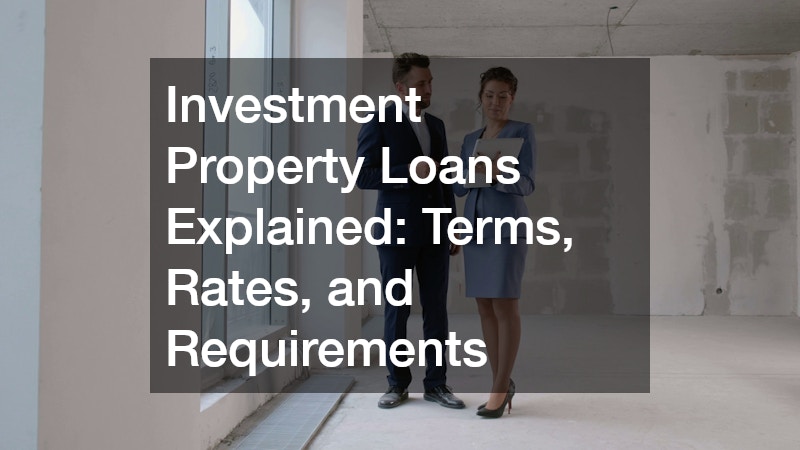
Investment property loans are a useful tool for real estate investors looking to expand their portfolios. Understanding the various terms, rates, and requirements associated with these loans can help investors make informed decisions. This article aims to demystify key aspects of investment property loans by focusing on the most frequently asked questions.
What are the Common Terms Associated with Investment Property Loans?
Loan Terminology: Definitions and Clarifications
Understanding key loan terminology is essential for navigating investment property loans. Terms such as loan-to-value ratio (LTV) and debt-service coverage ratio (DSCR) help investors gauge financial leverage and the ability to cover debt through rental income.
The loan-to-value ratio (LTV) is a measure of the loan amount relative to the appraised value of the property, which affects both loan approval and interest rates. On the other hand, the debt-service coverage ratio (DSCR) is used by lenders to evaluate whether a property’s income will cover its operating expenses and loan payments.
Another critical term is the amortization period, which defines the schedule of loan repayments over time. An understanding of these terms can empower investors to better negotiate loan conditions and optimize their investment strategies.
The Impact of Loan Terms on Investment Strategies
Different loan terms can significantly impact investment strategies by influencing both immediate financial obligations and long-term profitability. Investors need to select terms that align with their specific financial goals and risk appetite, especially in fluctuating real estate markets.
Flexible loan terms may allow investors to redirect funds towards property improvements or additional investments, potentially increasing their portfolio’s value. Conversely, more rigid terms might limit financial maneuverability, although they can ensure fixed, predictable expenses.
A well-rounded understanding of loan terms enables investors to weigh pros and cons meticulously, helping them achieve a balance between growth aspirations and fiscal responsibility.
What Factors Determine the Rates on Investment Property Loans?
Variables Influencing Interest Rates
Interest rates on investment property loans are influenced by several factors, including borrower creditworthiness, prevailing market conditions, and the type of property being financed. For instance, a high credit score can lead to more favorable rates, reflecting the perceived lower risk to lenders.
Market interest rates set by central banks also play a crucial role, affecting the base rate at which lenders offer loans. Additionally, the property type—commercial versus residential—can impact rates, as commercial properties often carry higher risks and thus, higher rates.
Another element is the loan’s structure, whether it’s a fixed-rate or an adjustable-rate mortgage. By understanding these variables, investors can better forecast expenses and strategize for optimal financial planning.
Strategies for Securing Favorable Loan Rates
Investors can implement various strategies to secure favorable loan rates for investment properties. Improving one’s credit score through paying down debts and ensuring timely bill payments can significantly enhance negotiating power with lenders.
Selecting the right lender, who specializes in investment properties, can also yield benefits, as they may offer competitive rates to attract business. Additionally, choosing a loan structure that aligns with market trends—like opting for a fixed-rate loan during periods of low interest rates—can provide long-term cost savings.
Investors can explore alternative funding sources such as private lenders or credit unions, which might offer more flexible terms. Careful research and preparation will facilitate securing the most advantageous rates possible.
What are the Requirements for Securing an Investment Property Loan?
Eligibility Criteria for Borrowers
Meeting the eligibility criteria is crucial for securing an investment property loan. Key requirements often include a good credit score, stable income verification, and a substantial down payment to minimize lender risk.
Lenders typically expect a minimum credit score of 620 for investment properties, though higher scores can unlock better terms and lower interest rates. Additionally, prepared income documentation is essential to demonstrate the ability to manage loan payments alongside other expenses.
A down payment of 20-30% is often required for investment properties, as lending risks are generally higher than those for primary residences. Understanding these criteria ensures a smoother loan application process, enhancing investment viability.
Documentation and Application Process
The application process for investment property loans requires comprehensive documentation to verify financial stability and eligibility. Essential documents often include tax returns, bank statements, proof of current income, and details of existing assets and liabilities.
Investors should also be prepared to outline their investment strategy and provide a clear business plan if applying for a commercial property loan. Gathering these documents ahead of time can prevent delays, facilitating a more streamlined approval process.
With careful attention to detail and a proactive approach to documentation, investors can improve their chances of achieving a successful loan outcome, thereby enhancing their portfolio expansion endeavors.
Investment property loans can be complex, but comprehending the terms, rates, and requirements is crucial for making sound real estate investment decisions. With the right knowledge and preparation, investors can effectively navigate the lending landscape and capitalize on lucrative property opportunities.





